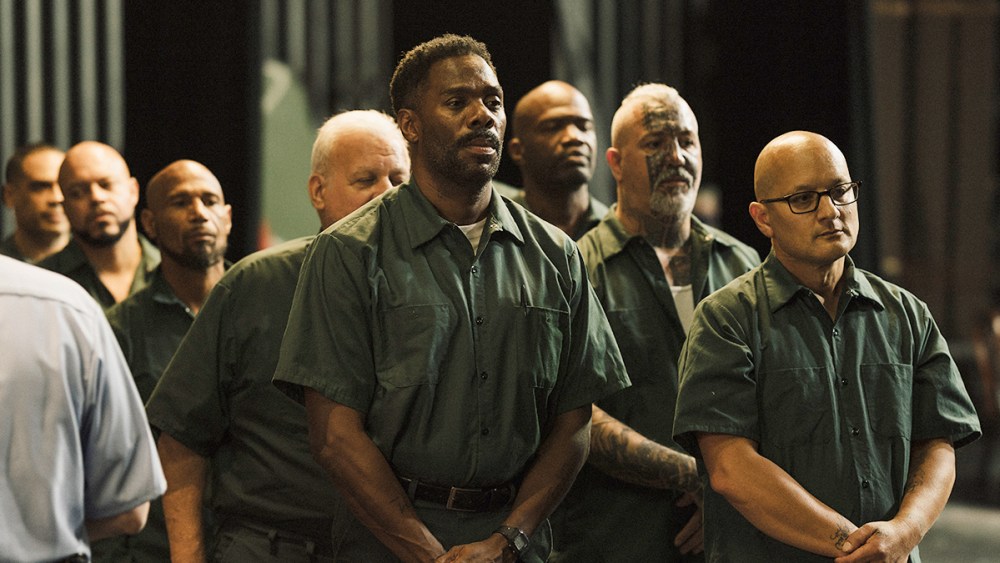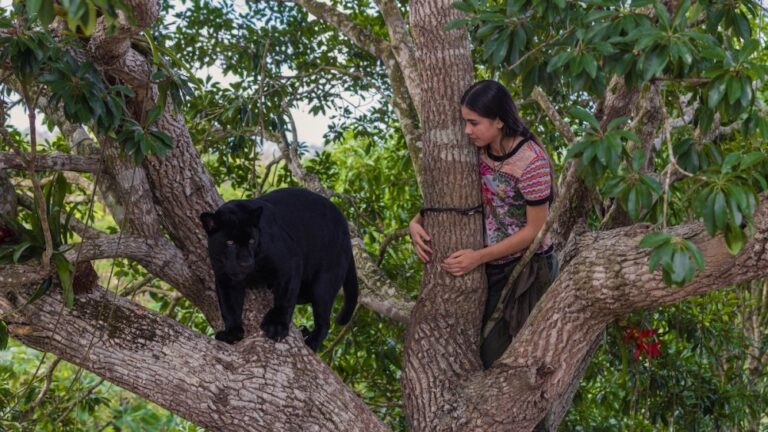Before “Sing Sing” became a critical hit and awards darling, it almost failed to launch.
The film, which shows the positive impact that the real-life Rehabilitation Through the Arts (RTA) program has on a group of incarcerated men, features Colman Domingo as a playwright incarcerated after being wrongfully convicted of murder. Domingo is one of only three professional actors in the cast, which is otherwise made up alumni of the RTA program.
It’s an ambitious project by any measure, but filmmakers Clint Bentley, Greg Kwedar and Monique Walton realized — albeit a little late — that it would be near-impossible without industry support. “We just realized that about a month before we started shooting,” says Kwedar, who directed the film. “I remember having a legitimate panic attack.”
Mere weeks before filming was set to start in the summer of 2022, the team faced a race against the clock to find the right partners to help get the project off the ground – and they couldn’t settle for just any financier. They had spent six years at work on “Sing Sing,” so anyone coming in at the eleventh hour needed to understand their vision.
With a precise, three-week window open to shoot and not a day to spare (Domingo had limited time for the project between “The Color Purple” and “Rustin”), Kwedar’s manager threw a Hail Mary, sharing the script with independent studio Black Bear, whose previous projects include “Mudbound” and “The Imitation Game.”
“They were three and a half weeks out from filming, and they said, ‘Colman’s going to be here in two weeks, and we really need to figure out how we’re doing this.’ And I said, Well, you’re in luck, because it’s the most beautiful screenplay I’ve ever read. I don’t know how you allowed yourself to get to this point where you’re on the ground without your plan in place,’” Black Bear founder, president and chief executive Teddy Schwarzman recalls of their first Zoom call. He soon came to understand why some of the logistics weren’t yet locked down. “They had been focusing so much on the things that that matter: on finding the right stories to tell, and the right members of RTA to cast, and creating community.”
But the film’s themes and unconventional casting weren’t the only things the filmmakers needed to convince Black Bear about. “They were in on the creative of the movie, and then at the end of the conversation, we’re like, ‘Well, we’re making this film in a very unique financial model where everyone’s gonna be paid the same rate, and all of our cast and crew are gonna own the movie together,’” Kwedar recalls. “They’re like, OK, that’s new.’”
“It’s a hard one to get people to buy into, because it takes your No. 1 on the call sheet, your director, your producers, your writer, to say that they may make less,” Schwarzman says, adding that Black Bear actually loved the structure. “Everyone feeling like an owner made this feel like something special … It was relatively easy to say yes to — despite the administrative burden of having 92 profit participants in the film.”
The morning after that fateful Zoom call, Black Bear officially put in an offer to fully finance the film. “We had to trust each other in very short order,” Schwarzman says.
“Teddy believed in the movie immediately. There was a lot of going back and forth on how to accommodate this really innovative technique the three of us were trying to make happen on this film, but there was no creative back and forth,” Bentley says. “The fact that he believed in it so clearly and so immediately and saw the beating heart behind the project was the thing that spoke to us all and gave us a lot of faith.”
What followed was a whirlwind two weeks during which Kwedar and Walton stayed at the cabin owned by Brent Buell, the RTA theater director depicted in the film by Paul Raci.
“I was crashing on the couch in the living room and Greg was downstairs in the basement, surrounded by costumes from the original ‘Breakin’ the Mummy’s Code’ production,” Walton says. “We found it to be a metaphor for where we were at in the process.”
Kwedar notes that he and Walton weren’t the only beneficiaries of Buell’s hospitality over the years. “When men would come home from prison and didn’t have anywhere to go, he and his wife Janice would open that same cabin up to allow those men to stay there with them until they could get on their feet,” Kwedar says. “So as we were adrift before the financing closed, they took us in in the same way!”
That inconceivable story behind the success of “Sing Sing” underscores Black Bear’s position as a one-stop-shop in the indie film space: in addition to producing and financing, the studio also repped the international rights for the project and distributed the film in Canada and the U.K. “Along the way, we started a management division, and Greg and Clint became clients of Black Bear,” Schwarzman says. “We worked as creative partners, financial partners, and then as representatives.”
With buzzy projects like Gregg Araki’s thriller “I Want Your Sex” and Sydney Sweeney’s untitled Christy Martin biopic in the works, “Sing Sing” serves as a compelling case study for Black Bear’s film pipeline. “We look for writers and directors who have something to say, and can say it in a way that is fresh, is bold, can break through to audiences and really stand out within the genre that it’s in,” Scharzman says.
Kwedar and Bentley have re-teamed with the studio for their next Sundance-bound project, “Train Dreams,” with Kwedar penning the adaptation of Denis Johnson’s novella and Bentley directing. “We believe in them greatly as the next great American filmmakers who have an eye towards nuance and empathy in the work that they make,” Schwarzman says.
Awards voters seem to agree — “Sing Sing” garnered three Gotham Awards and is up for five more trophies from Critics’ Choice; Domingo, who earned a Golden Globe nomination for his performance, has emerged as a frontrunner in the Oscar race.
“Somehow, Greg and Clint and Monique were able to will it into existence after seven years of trying to develop and crack the story,” Schwarzman says with a smile. “It sort of defies all the odds of films that Hollywood is traditionally trying to make, and yet … it exists.”













